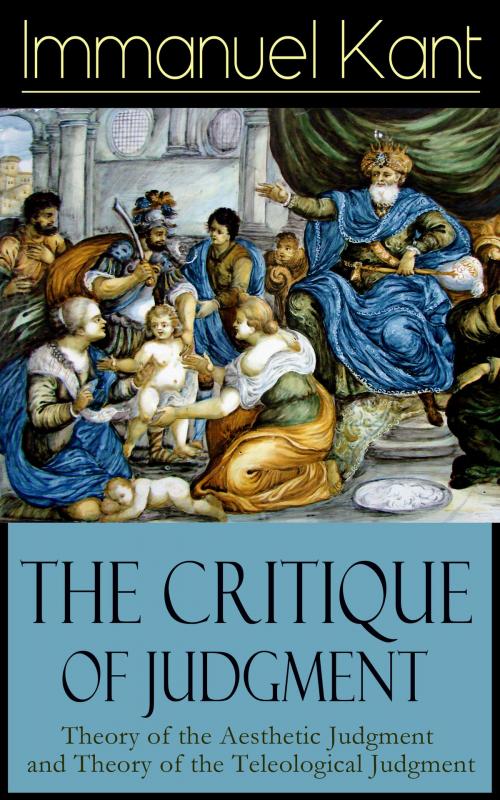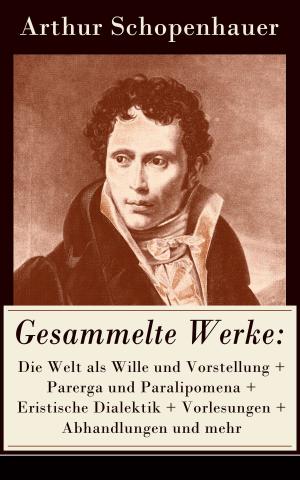The Critique of Judgment: Theory of the Aesthetic Judgment and Theory of the Teleological Judgment
Critique of the Power of Judgment from the Author of Critique of Pure Reason, Critique of Practical Reason, Fundamental Principles of the Metaphysics of Morals & Dreams of a Spirit-Seer
Nonfiction, Religion & Spirituality, Philosophy, Humanism| Author: | Immanuel Kant | ISBN: | 9788026845256 |
| Publisher: | e-artnow | Publication: | October 1, 2015 |
| Imprint: | Language: | English |
| Author: | Immanuel Kant |
| ISBN: | 9788026845256 |
| Publisher: | e-artnow |
| Publication: | October 1, 2015 |
| Imprint: | |
| Language: | English |
This carefully crafted ebook: "The Critique of Judgment: Theory of the Aesthetic Judgment and Theory of the Teleological Judgment” is formatted for your eReader with a functional and detailed table of contents. The Critique of Judgment, also translated as the Critique of the Power of Judgment and more commonly referred to as the third Critique, is a philosophical work by Immanuel Kant. Critique of Judgment completes the Critical project begun in the Critique of Pure Reason and the Critique of Practical Reason (the first and second Critiques, respectively). The book is divided into two main sections: the Critique of Aesthetic Judgment and the Critique of Teleological Judgment, and also includes a large overview of the entirety of Kant's Critical system, arranged in its final form. The end result of Kant's Critical Project is that there are certain fundamental antinomies in human Reason, most particularly that there is a complete inability to favor on the one hand the argument that all behavior and thought is determined by external causes, and on the other that there is an actual "spontaneous" causal principle at work in human behavior. Immanuel Kant (1724-1804) was a German philosopher, who, according to the Stanford Encyclopedia of Philosophy is "the central figure of modern philosophy." Kant argued that fundamental concepts of the human mind structure human experience, that reason is the source of morality, that aesthetics arises from a faculty of disinterested judgment, that space and time are forms of our understanding, and that the world as it is "in-itself" is unknowable. Kant took himself to have effected a Copernican revolution in philosophy, akin to Copernicus' reversal of the age-old belief that the sun revolved around the earth.
This carefully crafted ebook: "The Critique of Judgment: Theory of the Aesthetic Judgment and Theory of the Teleological Judgment” is formatted for your eReader with a functional and detailed table of contents. The Critique of Judgment, also translated as the Critique of the Power of Judgment and more commonly referred to as the third Critique, is a philosophical work by Immanuel Kant. Critique of Judgment completes the Critical project begun in the Critique of Pure Reason and the Critique of Practical Reason (the first and second Critiques, respectively). The book is divided into two main sections: the Critique of Aesthetic Judgment and the Critique of Teleological Judgment, and also includes a large overview of the entirety of Kant's Critical system, arranged in its final form. The end result of Kant's Critical Project is that there are certain fundamental antinomies in human Reason, most particularly that there is a complete inability to favor on the one hand the argument that all behavior and thought is determined by external causes, and on the other that there is an actual "spontaneous" causal principle at work in human behavior. Immanuel Kant (1724-1804) was a German philosopher, who, according to the Stanford Encyclopedia of Philosophy is "the central figure of modern philosophy." Kant argued that fundamental concepts of the human mind structure human experience, that reason is the source of morality, that aesthetics arises from a faculty of disinterested judgment, that space and time are forms of our understanding, and that the world as it is "in-itself" is unknowable. Kant took himself to have effected a Copernican revolution in philosophy, akin to Copernicus' reversal of the age-old belief that the sun revolved around the earth.















